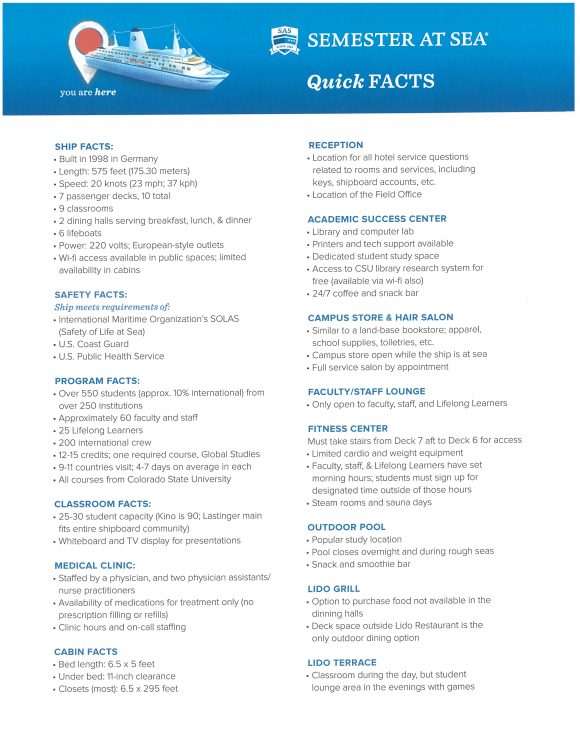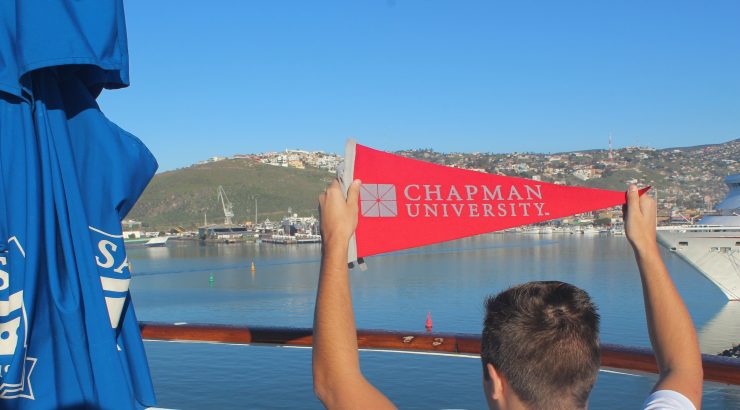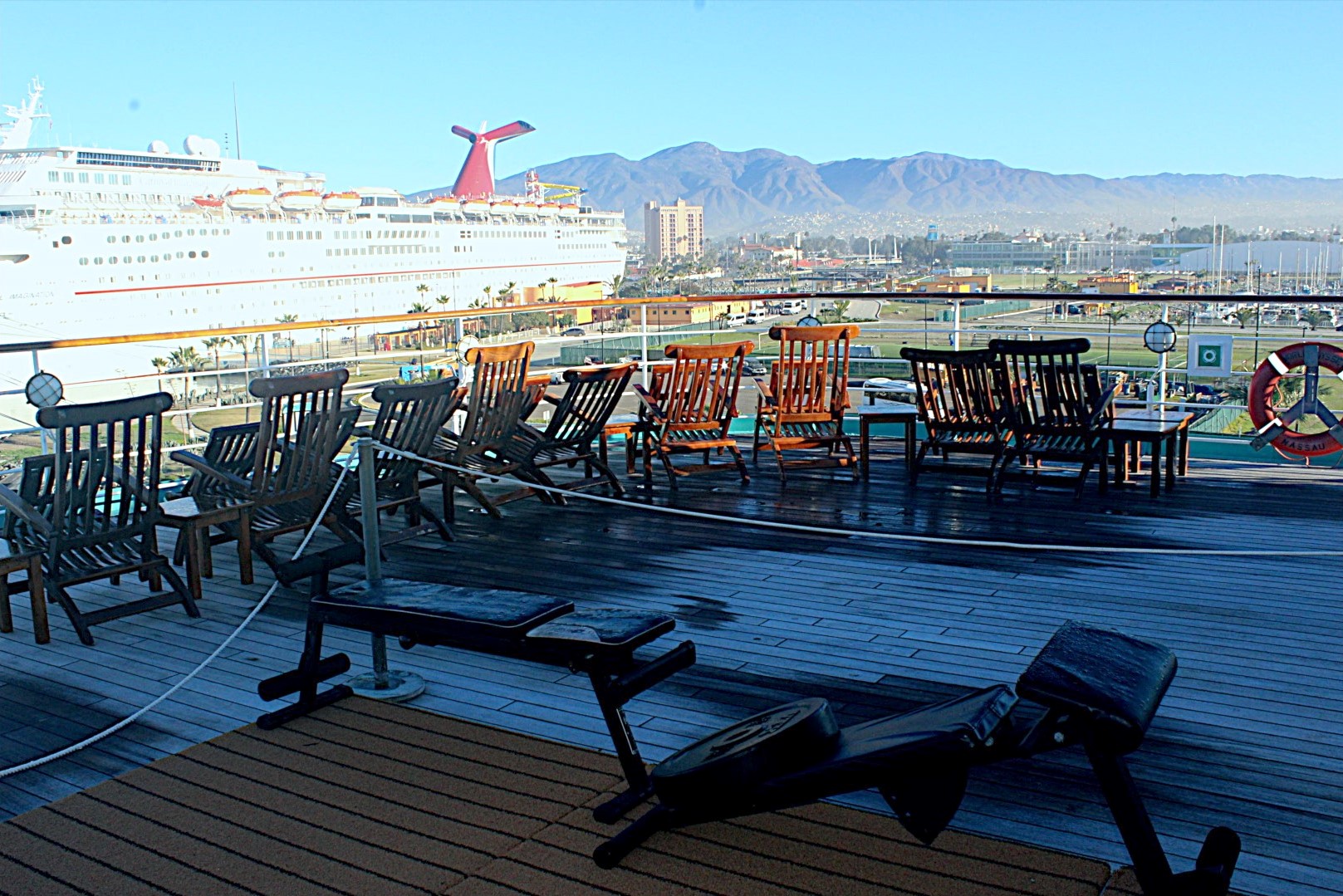Semester at Sea An Atypical Study Abroad Program with Hidden Benefits
January 13, 2020
Semester at Sea (SAS) is a study abroad program in which students live and take all their classes on a ship while visiting nearly a dozen countries. No other program integrates circumnavigating the planet into the curriculum. In fact, Chapman was an original founder and the primary academic sponsor of SAS from 1965-1975. This January, Global Education Advisors McKenna Hughes and Daniel Garcia went on-site (or onboard) to learn more about the program for themselves.
“In fact, Chapman was an original founder and the primary academic sponsor of SAS from 1965-1975.”
Boarding the ship is much like boarding an airplane in that there are security lines and passport checks. However, different from boarding a plane and indicative of the essence of Semester at Sea, students boarding the ship are accompanied by smiling crew members, supportive staff, and peers who are equally eager and trepid to get to know one another. Anyone can noticeably feel this ‘essence’ from the point of embarkation throughout the semester, and that is what differentiates Semester at Sea.
Anyone who has studied abroad will tell you that they bore friendships with which they maintain contact to this day. Those friendships are often profound and unmalleable. Nevertheless, Semester at Sea seems to produce a pronounced level of community that other programs cannot replicate. If you met someone from Semester at Sea, they probably told you that they spent time playing Monopoly® in Lido Terrace, shaving their head while crossing the equator to celebrate Neptune Day, or bidding on peanut butter or hot sauce. In times when participants on traditional programs could spend their time scrolling Instagram® or watching Netflix®, SAS participants spend their time playing, studying, and talking with each other due to the limited Wi-Fi onboard. While this seems daunting to students at first, they learn what life is like disconnected and end up augmenting their oral communication skills – a career readiness key competency according to the National Association of Colleges and Employers®. In fact, SAS informed McKenna and Daniel that many students pay extra for additional Wi-Fi at the start of the voyage, but that trend diminishes as the program continues and students become less attached to their phones and laptops. The result? A strong, interconnected community.
“The result? A strong, interconnected community.”
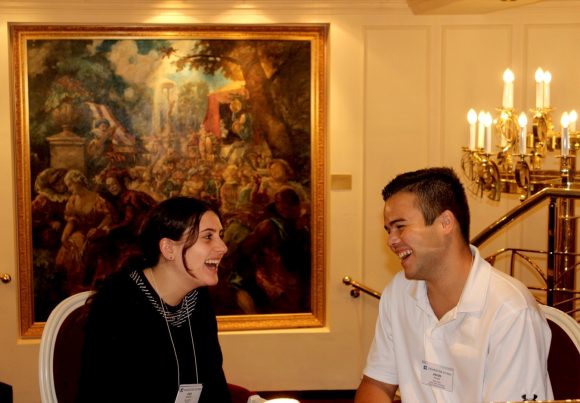
The close living quarters that cruise critics condemn actually provide another hidden benefit to this nontraditional program. On most programs and in most universities, faculty interaction can range from difficult to attain to nonexistent. On the ship, students will inevitably eat, exercise, and relax next to their professors at some point. Something about seeing professors eat a burger, reprimand their children at the pool for running, and reading a book seems to humanize them in a way that makes it less intimidating for students to interact with them. As such, faculty interaction on SAS can be more easily attainable than on other programs.
In addition to faculty, Semester at Sea fills its ship with decks of support. Six Resident Directors (RD) are assigned “seas,” or halls much like in a dormitory, which replicate living learning communities on U.S. campuses. Students, thus, have someone dedicated to their well-being while onboard and a “go-to” contact for any issues. Along with the RDs, Semester at Sea also employs two doctors, a nurse, two counselors, and the entire ship crew who handle everything from housekeeping and laundry to a salon and restaurant. Undoubtedly, students receive a lot of support on this program.
“…faculty interaction on SAS can be more easily attainable than on other programs.”
When considering the traditional semester abroad model (wherein students live in one country and take classes at a local university or study center) and Semester at Sea, it is clear that both programs offer their own different benefits and challenges. Realistically, Semester at Sea cannot produce the same level of language acquisition nor deep cultural immersion that a traditional program can. Similarly, a traditional program cannot produce the same level of community, faculty interaction, or support that Semester at Sea can. Students should consider the realities of both types of programs and decide which is a better fit for them. The Center for Global Education’s Global Education Advisor team is ready to help students discuss and choose the best program for them.
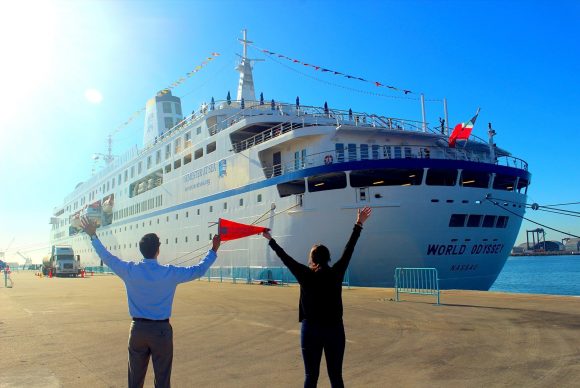
More information, including information on courses, scholarships, cabins, field programs, and shipboard facilities, can be found on the Semester at Sea website. Students can apply through the Center for Global Education’s application portal (the Global Gateway). Chapman offers Semester at Sea Chapman Scholarships that are available only to Chapman students who apply to Semester at Sea.
